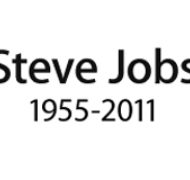Steve Jobs: For This I Came
Blog / Produced by The High Calling
Last week, my son talked to his cousin on Facetime. They were playing Legos together, turning their iPods back and forth, alternating between seeing each other’s faces and seeing each other’s toys.
Last month, my daughter disappeared into her bedroom with the same device for several hours and emerged with a short film “newscast” complete with interviews (between herself and herself), voice overs, and dramatic slow motion clips of her friends being silly.
These are the gifts of Steve Jobs.
Like Gutenberg, his gifts to the world created space for more creativity. His work led to the Apple II in 1977, the Macintosh computer in 1984, the iPod in 2001, the iPhone in 2007, and the iPad in 2010. These products do more than connect us to the internet or the app store. They are more than media consumption devices. They are creative tools that carefully limit the user experience to eliminate as many distractions as possible.
The gifts of Steve Jobs
Every life has a purpose. Every human has received gifts. Steve Jobs found purpose in the gifts he was given and shared his talents in a way that has benefitted all of humanity.
CNN reported this morning about Steve Jobs: "He did what a CEO should: Hired and inspired great people; managed for the long term, not the quarter of the short-term stock price; made big bets and took big risks."
Steve Jobs embodied the tension we all feel between our desire to do great things and our need to be present in the world. As Christine Scheller and Dr. Allan Josephson explained just this morning on The High Calling, “it is not uncommon to ask a young child, ‘What do you want to be when you grow up?’ …[this] question reflects a deep assumption that identity is tied up in vocation, that our being is synonymous with our doing.”
Finding Purpose in Work
For most of the Western World, our doing is wrapped up in our work. As a culture, we find our purpose and our identities in our work. Poet Gerard Manley Hopkins explained it this way, “Whát I do is me: for that I came.”
Jobs led his life by this mantra, seeking to put a dent in the universe, hoping to change the way people interact with each other and with information. He believed so strongly in the power of his work and the importance of excellence, that it was sometimes alarming.
In 2004, Jobs told Businessweek, "You'd be surprised how hard people work around here. They work nights and weekends, sometimes not seeing their families for a while. Sometimes people work through Christmas to make sure the tooling is just right at some factory in some corner of the world so our product comes out the best it can be."
Celebrating a Focused Life
Many of us struggle to find balance in our life and work. Jobs also struggled for balance. In 2010, John Sculley told Businessweek, Steve Jobs “always believed the most important decisions you make are not the things you do, but the things you decide not to do.”
People have criticized Jobs for the things he chose not to do. Jobs himself expressed regret from some of his choices over the years. But human imperfections should never prevent us from celebrating a person’s life and work.
This morning, I was talking with Dan Roloff, editorial director for Laity Renewal and The High Calling, before starting this article. Dan said, “Whether we love Apple products or not, we can’t deny the impact Steve Jobs has had on our lives. In the 1970s Ken Olsen [the CEO of a leading computer company at the time] was telling people, ‘There is no reason for any individual to have a computer in his home.’ But Steve Jobs and Steve Wozniak were creating a product that would change the world, the way we work, the way we gather information, the way we relate to each other as human beings, and the way we stay in contact with what is happening around the world in real time.”
Farewell, Steve Jobs. Your life of common grace is an inspiration.





